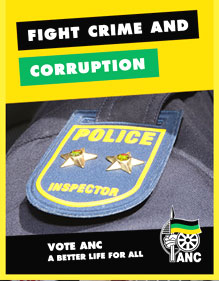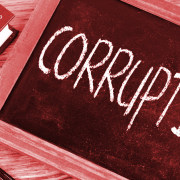|
Getting your Trinity Audio player ready...
|
 The 2014 national elections mark the 20-year anniversary of the ANC-led government and while views on whether or not the country’s fortunes have improved vary widely, even the most rosy-bespectacled of citizens would have a hard time denying that corruption has become a massive problem in recent years.
The 2014 national elections mark the 20-year anniversary of the ANC-led government and while views on whether or not the country’s fortunes have improved vary widely, even the most rosy-bespectacled of citizens would have a hard time denying that corruption has become a massive problem in recent years.
Because there has been only one party in power over the last two decades, our analysis of the governmental anti-corruption stance is necessarily focused on that party’s manifestos over the period.
A look back reveals that the situation was brighter at first. In its first election manifesto back in 1994, an optimistic ANC promised to “encourage private citizens to use the independent office of the public protector to investigate corruption, dishonesty or violation of rules of conduct on the part of government officials — those found guilty will be dealt with.”
The government administration exists to serve the people, and must be answerable to them, said the ANC hopefully.
While the office of the public protector has done commendable work over the years, its findings have not always been favourably received by the ANC, nor has the party consistently followed its own advice – the public protector’s latest investigative report on the multi-million-rand upgrades to President Jacob Zuma’s house reveals fierce resistance at many stages of the investigation, and lack of co-operation from officials involved, starting at the very top.
Soon after those first elections, the government entered into the arms deal, formally known as the Strategic Defence Package – the multi-billion-rand military acquisition project finalised in 1999. This lucrative procurement project opened up opportunities for corruption – so much so that author, arms trade expert and former ANC MP Andrew Feinstein called it the “point at which the ANC lost its moral compass”.
It arguably set the tone for future government procurement and in the 15 years since, answerability to corruption allegations related to it and some other deals has been nowhere in sight.
Getting tough on crime and corruption in 1999
However, in 1999 the ruling party declared in its second manifesto that it would combat crime and corruption by being “tough on the underlying causes of crime such as poverty and inequality, and tough on crime and corruption themselves”.
It would also put systems into place that would eliminate fraud and corruption from its social security programme. But the South African Social Security Agency was recently taken to court for irregularly awarding a R10-billion tender to a private company, bringing into question the effectiveness of those systems.
“We will enforce strict measures, without fear or favour, to root out corruption in the public and private sectors, in our own organisation, and in society as a whole,” said the ANC boldly, adding that it had introduced special measures such as dedicated anti-corruption units, the office of the public protector, and procedures to “expedite disciplinary action against those guilty of corruption in the public sector”.
The manifesto’s section on corruption concluded by saying: “Together, let us root out corruption, nepotism and bribery – regardless of who is involved”.
Many words but less action
Fast-forward five years to the 2004 elections, and the party had made anti-corruption one of the components in Vision 2014, its plan for the second decade of democracy. It planned to deploy more police officers, improve border security, and “ensure efficient functioning of all anti-corruption structures and systems including whistle-blowing, blacklisting of corrupt companies, implementation of laws to ensure exposure of, and action against, private sector corruption, and quicker processes to deal with any corrupt civil servants and public officials.”
However, the Public Service Commission’s (PSC) 2012 report on the effectiveness of the national anti-corruption hotline revealed that between 1 September 2004 and 31 August 2010, out of 7 922 cases of confirmed corruption that were referred to relevant government departments for further action, just 1 821, or 23% of cases were dealt with and closed. The PSC also lamented the fact that it received feedback on just 37% of the cases.
The ANC was also going to “strengthen the prosecution system and the Scorpions”. The Scorpions, the highly successful anti-corruption unit of the National Prosecuting Authority, was eventually disbanded in January 2009 and the remaining Scorpions members moved to the police’s Directorate for Priority Crime Investigation, also known as the Hawks. The Hawks have since shut down the probe the Scorpions had been conducting into arms deal bribery.
By the time the 2009 elections manifesto was published, the ruling party was no longer talking about eliminating corruption, as it had in its manifesto for the 2000 local elections, when it promised that ANC councillors would “eliminate corruption and nepotism from local government”. Those very councillors are getting away with murder today – in November 2013 the minister of co-operative governance, Lechesa Tsenoli, revealed that 522 incidents of serious corruption had been recorded at municipalities in the past four years.
Rather, the ANC had identified the fight against crime and corruption as one of its five priority areas for the next five years – along with job creation, education, health and rural development – and accordingly it would “step up measures in the fight against corruption within society, the state and private sector, including measures to ensure politicians do not tamper with the adjudication of tenders. Measures will also be taken to ensure transparent process of the tendering system as well as ensuring much stronger accountability of the public servants involved in tendering process.”
Corruption Watch, which was launched in 2012, received 465 reports related to public sector tender corruption between January 2012 and the end of January 2014, and has also been involved in a number of investigations that highlight the ease with which tender processes can be tampered.
Elimination of corruption not spoken of now
In its 2014 manifesto the ANC conceded that it could only “intensify the fight against corruption in both the public and private sectors by introducing measures to restrict public servants from doing business and holding public officials individually liable for losses incurred as a result of corrupt actions. We will pursue action against companies involved in bid-rigging, price fixing and corruption in pact and current infrastructure build programmes.”
It also said that it would “require any ANC member or [ANC] public representative found guilty by a court of law to step down from any leadership positions, in the ANC, government and society“– a puzzling statement in light of the party’s latest national assembly list, which features a number of members who were indeed found guilty of fraud in a court of law.
The emphasis on the perpetrators of corruption has also shifted, from 1999’s general statement that “apartheid bestowed on us a legacy of crime and corruption” to the 2004 admission of corruption in government and business, to this year’s direct finger-pointing at ANC members behaving badly. From the early days of calling for citizens to proactively report corruption to institutions such as the public protector, the 2014 manifesto is now about fighting corruption within the party’s own ranks.








